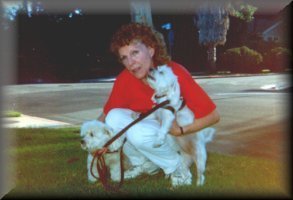
By
Angela Fox Dunn
Style,
flair,
individuality---panache! It's the quality we usually acquire
in our
middle years when we no longer fear being different. Panache
is a
lot older than that tired buzz word, charisma, and is more
exterior. Its
original meaning was an ornamental addition, a tuft of plumes on a
helmet. Henry IV of England, Henry of Navarre, allegedly roused
his
troops with the battle cry, "Let my white panache be your rallying
point." I'll venture a guess that the expression "a feather in
your cap" evolved from the word's origin.
Pablo Picasso was visiting an exhibition of
children's drawings and observed, "When I was their age, I could draw
like
Raphael, but it took me a lifetime to learn how to draw like
them. You
see, it takes a long time to grow young."
(Picasso fathered his last child, Paloma, at age 68, and was
painting on
the day of his death at 92).
My daring
came late in life, partly
because I was a stutterer in my early years.
I was
afraid to raise my hand in
class at the private boarding school my parents chose, even though I
knew the
answer to the teacher's question. I did
not want
to be different. In
fact, the only thing I liked about the school was the uniform, a white
blouse
and navy blue jumper. We all looked alike, and
I found
that comforting then.
I thought about joining the army when I grew
up, but I had learned in childhood that I was
not good at following orders.
It takes self-assurance to develop your own
style, the joie de vivre that
usually
comes with maturity.
We can ripen at thirty, fifty, or seventy. It's not a dead end. "Maturity is a place
you never actually reach," says Dr. Edward Stainbrook,
founder of USC's School
of Human Behavior, "Just be sure
you're on the right road to do it. Check
your direction, not the calendar."
It's all a conspiracy, you know, this age
business. When the eternal Zsa Zsa
Gabor was asked which of the Gabors is the
oldest, the outlandish Hungarian
replied, "Well, she'd never admit it, but
it's Mama." Zsa Zsa's always had
panache.
Questioned on how
many husbands she's had, Gabor inquired,
"You mean
apart from my
own?"
I've always been opposed to counting age
chronologically, even as a youngster.
Coming from a theatrical family I noted
that the actors we entertained
at dinner parties always looked younger than my school teachers, though
they were in the same
generation. What made the difference was
pizzazz, a grand manner, an outrageous sense
of humor.
This is a fact: the whole world notion of
slowing down, doing less, feeling
older, and
finally retiring came
from Otto von Bismarck, first chancellor of the German empire.
Life
expectancy in Germany in the 1890s was in office. Only now
is the
figure being challenged and upped. (By the year 2000 one in eight Americans
will be 65 of older).
People with panache don't seem to age.
Their flair for life grows more colorful as they add new dimensions,
accept new
challenges, remain curious.
You can dress and adorn your body, "…but style is the vehicle the
spirit." So wrote English essayist Sydney Smith more than 150 years ago. And style
is not the result of
formal education or wealth. I've known
grammar
school dropouts who are
sparkling stars, and Ph.Ds who are black holes with no ball of energy
inside.
And as Shakespeare's King Henry VI,
Part II
declares, "Whose large
style agrees not with the leanness of his purse.
Mae West had it. Tom Wolfe in his white suits
has it. Sensational Sophia Loren has it.
Fred Astaire and Cary Grant had it forever. But some of the
world's "most beautiful people" have
no panache; there's no vitality, no inner
glow.
Panache
can be shown in a
gesture. Audrey Hepburn told me a story about
her first meeting with Cary Grant (and Audrey
had in it spades!): "Stanley
Donen (the
director of
"Charade" 1963) arranged this dinner so Cary and I could meet. I was a bit nervous, and I
just accidentally happened to knock
over my
wine glass. Cary was wearing
pale gray flannel and it was red wine.
I ruined
his suit! I felt just
awful. And he knew it. He mopped it up very nonchalantly.
The next day he
sent me a box of candy to show he didn't
mind,
which was adorable." Now
that's style!
You don't
have to be a wit to have
panache, but it helps: Noel Coward,
Dorothy Parker, Groucho Marx, just for
starters, still are frequently quoted.
Sending a
note to the hostess of a boring
dinner party he attended, Marx
wrote:
"I've been to a lot of
wonderful parties, but this wasn't one of them." A wealthy
society matron in Houston,
Texas likes to remark, "I married well
and
divorced better."
I think
you're born with class, but
you can develop panache. And keep
developing
it. Don't slow
down; if anything, speed up. "The course of aging is not time-locked," says UCLA brain
researcher, Dr. Arnold B. Scheibel. "It is
possible for an 80-year-old to have
a 30-year-old brain." The secret is use. "We know for a
fact that dendrites are lost when they're not used," says
Scheibel. "Keep challenging your
mental and emotional capacities. Learn a new
skill, study a new
project, fall in love!"
The word famous cellist Pablo Casals was asked
why in his 90s he was still practicing
six hours a day. He answered,
"Because I think I'm making
progress."
(Casals lived
to age 97.)
You can have panache in any field. Gen. George
Patton had it. Donald Trump has it.
(Bill Gates does not have it.). Love him or hate him, Howard Stern has
it. People with
panache tend to be leaders, trend-setters, standouts from the
crowd.
Elton John, Little Richard, and Tina Turner have it. Lauren Bacall had
it at 19 and still has it
over 50 years later. The late Princess Diana
had it, but Prince Charles never did. So
if you have it, flaunt it, baby, flaunt
it. Vive le panache!
©Angela Fox Dunn (7-12-98)


